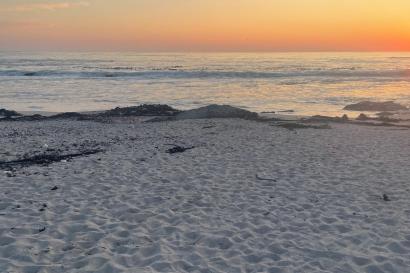I’ll admit, the water crisis in Cape Town was intimidating when I was considering South Africa for study abroad. People were confused as to why I wanted to study somewhere with water restrictions. Friends and peers often asked: “Wait, isn’t Cape Town in a drought?” with furrowed brows and noticeable concern. Before I arrived, I felt the need to mentally prepare for using less water, as if it were a lifestyle I couldn’t possibly just walk into.
What I’ve found, actually, has been that I am perfectly fine.
In fact, I’d say I have grappled more with how wasteful my water habits were in the states since I’ve been here than I have with the adjusting to less water use. For me, it has just meant shorter showers, less frequent laundry loads, and more attentive dish-washing, but by all means no dramatic life changes.
One interesting aspect of the water crisis that I have faced in the past two weeks has been the way in which the University of Cape Town has dealt with it. Initially, I was unsure how an institution as large as UCT could possibly conserve water, but I have come to the same realization as with my own water use: reducing water is so do-able.
In UCT restrooms, signs are posted to encourage that toilets only be flushed when they need to be, and sinks emit a mist of water instead of a steady stream. Some bathrooms even just have hand-sanitizer. In addition, flyers and stickers are posted throughout campus to promote conservative water use. #SlowtheFlow and #WaterWise can be spotted in hallways, bathrooms, the Jamie shuttles, and even on buildings on campus. “Wear, Air, and Re-wear” stickers are also seen on campus, promoting smarter laundry habits. The tone of UCT’s water campaign, I’ve noticed, is fairly positive. While signs may warn of “Day Zero”, they often offer simple recommendations and helpful tips for reducing water. The general message seems to be “We can do it!”, especially in UCT’s pledge to cut 50% of its water usage – a goal that encourages all students to participate in water saving efforts. I would say that many, if not all, students recognize their part in the community’s effort to decrease water use.
The realization I have come to is that no one needs to use anywhere near the amount of water we use in the United States. Here in Cape Town, it’s not just about saving water, but it’s much more about using just enough. With that mentality, the water crisis doesn’t demand any extreme water saving skills, but simply smarter ways of using water, and only using it when really necessary.
Especially after seeing the simple, yet innovative, ways in which UCT has managed to conserve water, there is no excuse for any one individual not to do the same.
So if the decision comes down to long twenty-minute showers or Cape Town, I’d choose Cape Town every time.

Darcy Jones
<p>Hi! I'm junior at Wake Forest University studying economics and sociology. I spent the first seven years of my life in Africa, so it was a no-brainer that I wanted to study there in college. Home is right outside of DC, where I embrace the opportunity to act like a tourist in my own city. For me, a perfect day would entail a trip to the beach, true crime dramas, and roasted brussels sprouts.</p>










